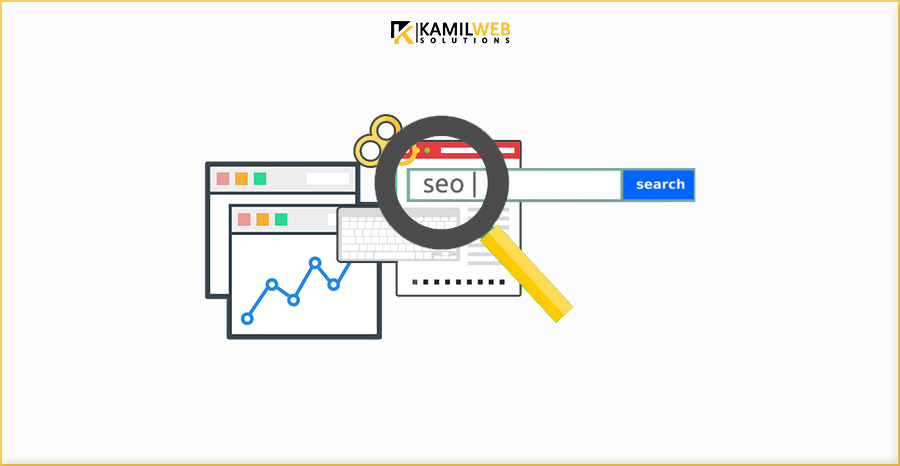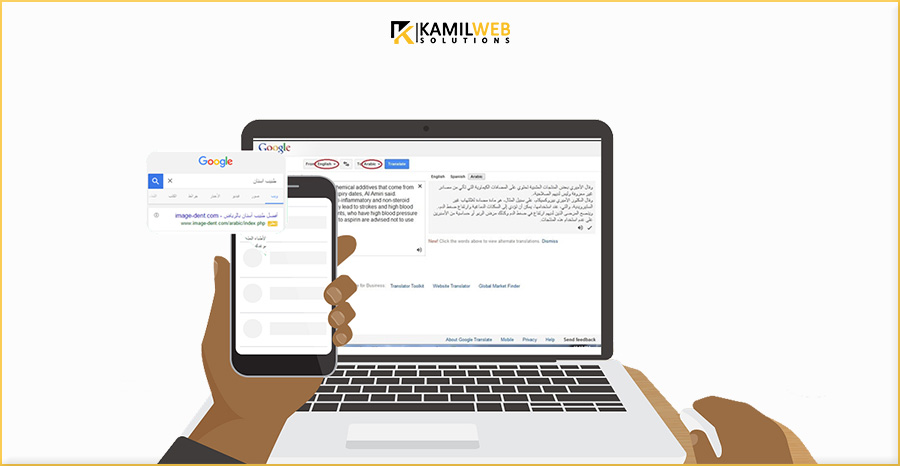+971-56-6256274
+971-56-6256274
How To Do SEO for Arabic Sites: A Beginner’s Guide

SEO for Arabic websites can be a bit tricky. You need to keep certain things in mind when trying to optimize your site for this market. Here is a comprehensive guide to help you get started. First, let us cover the basics.
What Is Arabic SEO?
Arabic SEO is optimizing an Arabic website for search engines to achieve higher rankings in the SERPs. Like any other form of SEO, Arabic SEO involves using various techniques and strategies to improve a website’s visibility and ranking in the search results.
Importance Of Arabic SEO
As the number of internet users in the Arab world continues to grow, so does the importance of Arabic SEO. If you’re running a website or blog in Arabic, you must make your content as visible as possible to Arabic speakers. After all, what’s the point in creating great content if no one can find it?
Are you seeking the best Arabic SEO results? Keep reading.
Opportunities For Google Arabic
Opportunities for Google Arabic abound, and many businesses and marketers are yet to exploit them fully. The truth is, ranking in Google Arabic is not as difficult as it seems. In this guide, we’ll show you how to do SEO for your Arabic website the right way. Arabic is the fifth most spoken language in the world, with over 422 million speakers.
It is also the official language of 26 countries and is spoken across the globe in various dialects. Given its wide reach, it’s no surprise that Arabic has become an important language for businesses and marketers. Doing SEO for Arabic websites should be at the top of your list if you’re looking to expand your reach to Arabic-speaking audiences.
It will help you reach a larger audience and give you a competitive edge over those who haven’t optimized their site for Arabic speakers. The good news is that optimizing your website for Google Arabic is not as difficult as it may seem. With the right approach and strategies, you can easily rank high in search results and reach your target audience.
Understanding Arab culture
Understanding Arab culture, customs, and traditions are essential to providing the best possible user experience on your Arabic website or app. Just as you wouldn’t build a website for the US market without understanding American culture, you can’t expect to succeed in the Arab world without taking the time to learn about Arabs and their culture.
Arab Consumers
Arab consumers are turning to the internet for their needs at an alarming rate, meaning businesses need Arabic-friendly websites to remain competitive. SEO for Arabic sites is a bit different than SEO for other languages, as Google’s algorithms are tuned specifically for Arabic language search queries. Arabic SEO experts know this.
Mobile SEO In The Arab World
As the internet becomes more accessible and affordable in the Arab world, mobile SEO is becoming increasingly important for businesses that want to reach new customers. Mobile SEO is the process of optimizing your website for mobile devices. You should know this before doing SEO for Arabic websites.
It includes ensuring your website loads quickly on mobile devices, has a responsive design, and is easy to use on a small screen. There are a few different ways to approach mobile SEO. One option is to create a separate mobile version of your website. It can be done using a separate URL (m.example.com) or responsive design techniques.
Another option is to use dynamic serving, which serves different content to mobile users based on their device type. It is done using the same URL but serving different HTML and CSS based on the user agent.
Google also offers a mobile-friendly test that you can use to check if your website is optimized for mobile devices.
Key Ranking Factors On Google In The Middle East
The Middle East is a large and growing market for businesses of all sizes. If you’re looking to expand your reach and tap into this lucrative market, it’s important to know how to optimize your website for Arabic-speaking users. This Arabic SEO guide will cover some key aspects of ranking on Google in the Middle East.
Think About Traffic That Converts
One of the most important things to keep in mind when optimizing for the Middle East is traffic that converts. It’s not enough to attract Arabic-speaking users to your website; you need to ensure that they’re taking the desired actions, whether making a purchase, signing up for a newsletter, or filling out a contact form.
There are a few key ways to do SEO for Arabic websites for conversions:
– Make sure your website is mobile-friendly. In the Middle East, more than 60% of internet users access the web from their smartphones. If your website isn’t optimized for mobile devices, you’re likely losing out on many potential customers.
– Use clear and concise copy. Your website copy should be easy to understand, even for those who are not native English speakers. Avoid jargon or industry-specific terms that might not be familiar to your Arabic-speaking audience.
– Use strong calls to action. Your call to action should be clear, concise, and visible. Make sure they’re placed prominently on your website and stand out from the rest of your content.
– Offer customer support in Arabic. If you have the resources, offer customer support in Arabic so your customers can get help in their native language. It will show that you’re truly invested in catering to your Arabic-speaking audience.
Keyword Research In Arabic
Keyword research is essential to any SEO strategy, and it’s especially important when optimizing for the Middle East. Not only do you need to identify which keywords are most relevant to your business, but you also need to make sure that you’re using the right Arabic dialect.
There are a few different ways to conduct keyword research while doing SEO for Arabic websites:
– Use Google AdWords Keyword Planner. This tool allows you to research keywords in Arabic and other languages. Simply select “Arabic” as the language and “All countries and territories” as the location.
– Use a bilingual dictionary. A bilingual dictionary can help you identify which words are most commonly used in Arabic search queries. It is especially helpful if you’re not familiar with the Arabic language.
– Use an Arabic keyword research tool. Many Arab keyword research tools are available, such as KeywordTool.io and SeoStack. These Arabic SEO tools allow you to enter English keywords and receive back relevant Arabic keywords.
Keyword Spelling And Dialect
Once you’ve identified the most relevant keywords for your business, it’s important to ensure that you’re using the correct spelling and dialect. It is especially important in Arabic, as several different dialects are spoken throughout the Arab world.
Some tips for ensuring that you’re using the correct spelling and dialect:
– If possible, hire an Arabic copywriter. A native Arabic speaker will be familiar with the various dialects and can help ensure that your content is properly optimized.
– Use an Arabic spell checker. Several online spell checkers can help you ensure that your content is free of errors.
– Pay attention to regional variations. Certain words may be spelled differently in different regions. For example, the word for “search” is spelled “إبحث” in Arabic script but “سرقة” in the Latin alphabet.
– Use keyword research tools. Keyword research tools can help you identify which keywords are most commonly used in Arabic search queries. This information can help ensure that you use the correct spelling and dialect to do SEO for Arabic websites.
Arabic Title Tags And Meta Descriptions
When optimizing your website for Arabic search engines, it’s important to use Arabic title tags and meta descriptions. These elements appear in the search results, so it’s important to ensure that they’re properly optimized.
Some tips for optimizing your Arabic title tags and meta descriptions:
– Use relevant keywords. Include relevant keywords in your title tags and meta descriptions so that they’re more likely to be picked up by Arabic search engines.
– Keep it short and sweet. Keep your title tags and meta descriptions concise and to the point. It will help ensure that they’re visible in the search results.
– Use persuasive language. Use persuasive language in your title tags and meta descriptions to encourage clicks from potential customers.
– Different Test versions. Try different versions of your title tags and meta descriptions to see which ones perform best.
Arabic Content
When creating content for your Arabic SEO websites, it’s important to keep a few things in mind:
- You must ensure that your content is relevant and targeted toward your Arab audience.
- You must ensure that your content is optimized for Arabic search engines.
- You need to ensure that your content is engaging and well-written.
Some tips for creating content to do SEO for Arabic websites:
– Write for your audience. Make sure that your content is relevant and targeted toward your Arab audience. It will help ensure that they’re engaged with your site.
– Optimize your keywords. Include relevant keywords in your content so that it’s more likely to be picked up by Arabic search engines.
– Keep it readable. Use simple, easy-to-read language in your content. It will help ensure that people can understand and engage with your site.
– Make it shareable. Create shareworthy content that is likely to be shared by your Arab audience. It will help increase your reach and visibility.
– Hire a copywriter. If possible, hire a professional copywriter who can help you create high-quality Arabic content.
Hreflang Tags
If you have a multi-lingual website, it’s important to use hreflang tags to indicate to Google which version of your site is intended for which market. It is especially important in Arabic, as several different dialects are spoken throughout the Arab world.
Some tips for using hreflang tags:
– Use the correct code. Make sure that you’re using the correct code for each market. For example, “ar-SA” is the code for Saudi Arabia and “ar-EG” is the code for Egypt.
– Include all variants. Be sure to include all variants of your site, such as “www” and “m.”
– Specify the language. Make sure to specify the language of each variant in your hreflang tags. It will help Google match your site to the appropriate market.
– Use the correct format. Make sure that you’re using the correct format for your hreflang tags. The most common format is “language_country.”
BackLinks
Regarding links, it’s important to keep a few things in mind while doing SEO for Arabic websites:
- You must ensure that your backlinks are relevant and target your Arab audience.
- You need to ensure that your backlinks are of high quality.
- You need to ensure that your backlinks are from reputable sources.
Some tips for creating high-quality links:
– Find relevant directories. Look for online directories that are relevant to your Arab audience. It will help ensure that your link is seen by people interested in what you offer.
– Get listed in local directories. If you have a local business, get listed in online directories that cater to your area. It will help increase your visibility and reach.
– Guest blog. Reach out to popular blogs in your industry and offer a guest blog for them. It is a great way to get exposure for your site and build relationships with other bloggers.
– Submit articles. Submit articles to popular article directories. It is a great way to get links from high-quality sources.
– Create infographics. Infographics are a great way to get links from other websites. Include a link to your site when you share your infographic on social media or other websites.
Regional Hosting
If you’re targeting Arab audiences, ensuring that your website is hosted in the region is important. It will help ensure that your site can load quickly for people in the region.
Some tips for regional hosting while doing SEO for Arabic websites:
– Use a content delivery network (CDN). A CDN can help deliver your content quickly and efficiently to people in different parts of the world.
– Host your website in multiple locations. Hosting your website in multiple locations can help ensure that your site is accessible no matter where people are.
– Use a reliable hosting provider. Be sure to use a reliable hosting provider with experience serving Arab audiences.
Arabic URLs
When it comes to URLs, it’s important to use Arabic characters. It will help ensure that your site is indexed properly by Google and other search engines.
Some tips for creating Arabic URLs:
– Use Arabic characters. Be sure to use Arabic characters in your URL. It will help ensure that search engines properly index your site.
– Use keywords in your URL. Try to include keywords in your URL that are relevant to your Arab audience. It will help improve your visibility in Arab search results.
– Keep it short and sweet. Keep your URL short and sweet. A shorter URL is easier to remember and share.
ccTLDs
If you’re targeting Arab audiences, using a country-code top-level domain (ccTLD) is important. It will help ensure that search engines properly index your site in the region.
Some tips for using ccTLDs while doing SEO for Arabic websites:
– Use a relevant ccTLD. Be sure to use a ccTLD that is relevant to your Arab audience. It will help ensure that Arab search engines properly index your site.
– Use keywords in your domain. Try to include keywords in your domain that are relevant to your Arab audience. It will help improve your visibility in Arab search results.
– Keep it short and sweet. Keep your domain short and sweet. A shorter domain is easier to remember and share.
Arabic Domain Names For Arabic SEO
Regarding SEO for Arabic sites, one of the most important considerations is choosing the right domain name. An Arabic domain name will make it easier for Arab users to find your site and help you rank higher in search engines.
There are a few things to keep in mind when choosing an Arabic domain name:
- Make sure the domain name is relevant to your content. The keywords in your domain name should be related to your site’s content. It will help users find your site more easily and will also help you rank higher in search engines.
- Keep it short and simple. A shorter domain name is easier to remember and type. It’s also less likely to be misspelled.
- Avoid using numbers and hyphens. These can be confusing for users and are often ignored by search engines.
- Choose a .com or .net domain name. These are the most common and most recognized domains.
- Register your domain name with a reputable registrar. It will ensure that your domain name is safe and secure.
When it comes to doing SEO for Arabic websites, choosing the right domain name is essential. Remember to choose a domain name that will help you rank higher in search engines and attract more Arab users to your site.
Are you looking for the best Arabic SEO consultant in Dubai? Keep reading.
Optimizing For Google’s Knowledge Graph In Arabic
As the internet continues to grow and expand, so does the importance of SEO. It is especially true for businesses that are looking to target Arabic-speaking customers or clients. While there are many ways to improve your SEO, one area often overlooked is optimizing for Google’s knowledge graph in Arabic.
The knowledge graph is a database of information that Google uses to provide relevant search results. Optimizing your website and content for the knowledge graph can ensure that your site appears more prominently in search results.
Here are a few tips on how to optimize for Google’s knowledge graph in Arabic:
1) Make sure your website is fully bilingual
If you want your website to appear in the knowledge graph, your site must be fully bilingual. All your content – from the menus to the blog posts – should be available in Arabic and English.
2) Use schema.org markup
Schema.org is a code you can add to your website to help search engines understand your content. Adding schema.org markup to your site can improve your chances of appearing in the knowledge graph.
3) Optimize your website for rich snippets
Rich snippets are search results that include additional information about your website. For example, if you have a recipe website, you may want to include rich snippets that include the ingredients and cooking time for each recipe. You should know this before you do SEO for Arabic websites.
4) Create a sitemap
A sitemap is a file that contains a list of all the pages on your website. By creating a sitemap and submitting it to Google, you can ensure that all your pages are indexed and appear in the knowledge graph.
5) Promote your content on social media
Social media marketing is a great way to promote your content and improve your SEO. When you share your content on social media, be sure to include links back to your website. It will help Google index your content and improve your chances of appearing in the knowledge graph.
Google Arabic Challenges
Here are the challenges most commonly faced while doing SEO in the Middle East.
Unnatural Tactics Common In The Region
Link buying and selling are rampant in the Arab world. There are also many cases of link farms, where a group of sites all links to each other to inflate their link popularity artificially. Content scraping is also a big problem.
Since there is no Google penalty for duplicate content in Arabic, many unscrupulous webmasters simply steal content from other sites and republish it on their own. It means that original content often gets lost in the shuffle, and it’s hard for searchers to find the best information.
Language Barriers
The vast majority of people in the Arab world speak Arabic as their first language. However, many speak French, English, or Turkish as their first language. It can make it difficult to target a specific audience with your content since you may need to translate it into multiple languages.
In addition, the different dialects of Arabic can also be a challenge. While most people in the Arab world can understand standard Arabic, many can only speak their local dialect. You may need to create separate versions of your content for different regions. You must be aware of this while doing SEO for Arabic websites.
Cultural Differences
The Arab world is made up of many different cultures and subcultures, which can make it difficult to target a specific audience. For example, while some Arabs are traditional and conservative, others are more modern and liberal. It can make it difficult to find common ground when creating content.
Spammy Content
Since there is no Google penalty for duplicate content in Arabic, many webmasters simply copy and paste content from other sites. The average Arabic website is full of low-quality, duplicated content.
Tracking Issues: Double-Check Rankings Regularly
The vast majority of Arabs access the internet from mobile devices. It can make tracking your website’s progress difficult since mobile rankings can be different from desktop rankings. In addition, many Arabs use private browsing mode when accessing the internet, which means that your website’s analytics may not be accurate.
Problems With Tracking Pixels
There are several ways to work around these tracking issues. One option is to use a tool like Google Tag Manager to manage your website’s tracking code. It will allow you to track your website’s progress even if users use private browsing mode. Another option is to use a mobile-specific tracking code, such as the one provided by Fierce Mobile.
Keyword Stuffing
Since there is no Google penalty for keyword stuffing in Arabic, many webmasters stuff their content with keywords to artificially inflate their search rankings. It can make it difficult for searchers to find the information they’re looking for and lead to a poor user experience. Understand it when you do SEO for Arabic websites.
Video SEO In The Arab World
There are over 300 million Arabic speakers worldwide, making Arabic the fifth most spoken language. The Arab world is a key market for many businesses, so it’s important to ensure that your website and content are optimized for search engines to reach your target audience.
Video is a great way to engage with potential customers and promote your brand or product, but how do you ensure that your videos are being seen by people who speak Arabic? It is where video SEO comes in.
Here are some tips on how to optimize your videos for Arabic search engines:
- Research popular keywords and phrases
- Use these keywords throughout your video title, description, and tags
- Create transcripts of your videos in Arabic
- Provide English subtitles for your Arabic videos
- Promote your videos on Arabic social media and video-sharing websites
Local SEO In Arab Countries
Local SEO in Arab countries is slightly different from how it is done in the West. Here are some tips to get you started on the right track:
- Understand how Arabs search
- Optimize your site for Arabic keywords
- Promote your content in Arabic social media
- Get listed in Arab directories and search engines
- Monitor your progress and adjust your strategy accordingly
Benefits Of SEO In Arabic That Aren’t In English
Here are the benefits of SEO for Arabic websites which do not exist for SEO in English.
Low Competition In Arabic
When it comes to SEO in Arabic, the competition is significantly lower than in English. It means that there is a higher chance of ranking on the first page of Google for your target keywords.
Higher Click-Through Rates
The click-through rate (CTR) is the number of times a user clicks on your result in the SERPs divided by the number of times your result appears in the SERPs. The CTR for results in Arabic is generally higher than for results in English.
Increased Traffic From Long Tail Keywords
Long tail keywords are usually four or more words long and are very specific. They have low search volume but can be extremely valuable as they have a high conversion rate. Due to the low competition for these keywords, it is easier to rank them.
More Conversions
Due to the increased CTR and traffic from long tail keywords, you will likely see an increase in conversions from your Arabic SEO campaign.
Websites With An Arabic Version Translated Without Considering SEO
One of the main problems with Arabic SEO is that many website owners simply translate their English websites into Arabic without considering SEO. It can lead to several problems, such as incorrect use of keywords and poor user experience.
It’s important to note that just translating your website into Arabic is not enough. You must ensure that you carry out keyword research to identify the right keywords to target and create relevant and engaging content for your target audience.
PPC Ads Are Less Competitive – SEO Takes More Space
In the Arab world, PPC is not as competitive as in other parts such as the US or Europe. It means that SEO takes up more space on the SERPs, so you are more likely to get traffic from your SEO efforts.
SEO is more affordable
As mentioned above, PPC is less competitive in the Arab world, which means it is more affordable. SEO is a more cost-effective option for businesses targeting Arabic-speaking users.
Companies Have A Short-Term Focus
One of the main problems with Arabic SEO is that many companies have a short-term focus. They are only interested in ranking for keywords that have high search volumes, and as a result, they neglect long tail keywords. It can be a mistake, as long-tail keywords can be extremely valuable, especially if you are targeting a specific country or region.
Less Savvy Digital Marketers
In general, digital marketing is not as developed in the Arab world as in other parts. Less experienced and less savvy digital marketers make it difficult to find good quality services. However, this also presents an opportunity for businesses to get ahead of their competitors by investing in Arabic SEO.
You can gain a competitive advantage and stand out from the crowd by doing so.
SEO Varies For Different Types Of Websites In The Region
Different types of websites have different needs when it comes to SEO. In this guide, we will go over some tips on how to do SEO for Arabic websites of different types.
Ecommerce
There are a few things to keep in mind when doing SEO for an ecommerce website in the Arab world. First, it is important to target the right keywords. The best way to find out what keywords are being searched for in the region is using a tool like Google AdWords Keyword Planner.
Once you have a list of relevant keywords, you can start optimizing your website for them. It includes on-page optimization (like making sure your titles and descriptions are optimized for the keywords) and off-page optimization (like building links to your website).
In addition, it is also important to make sure that your website is mobile-friendly. Many users in the region access the internet from their smartphones. If your website is not mobile-friendly, you will likely lose a lot of potential customers.
More Tips
Finally, it is also worth considering localization when doing SEO for an ecommerce website in the Arab world. It means ensuring that your website is available in Arabic and that your prices are listed in local currencies. Doing this will make it much easier for potential customers in the region to purchase from your store.
Lead Generation
When running a lead generation website in the Arab world, there are a few things to remember when doing SEO. First, it is important to target long-tail keywords. These are keywords that are more specific and usually have less competition. For example, instead of targeting “real estate,” you could target the keyword “apartments for sale in Dubai.”
Second, ensuring that your website is designed for conversion is also important while doing SEO for Arabic websites. It means having a clear call-to-action on every page and making it easy for visitors to contact you.
Finally, it is also worth considering localization when doing SEO for a lead generation website in the Arab world. It means ensuring that your website is available in Arabic and that your contact information is listed in local time zones. Doing this will make it much easier for potential customers in the region to get in touch with you.
News And Media Sites
There are a few things to keep in mind when doing SEO for a news or media website in the Arab world. First, it is important to target keywords that are relevant to your content. The best way to find out what keywords are being searched for in the region is using a tool like Google AdWords Keyword Planner.
Once you have a list of relevant keywords, you can start optimizing your website for them. It includes both on-page optimization and off-page optimization. Second, ensuring that your website is designed for engagement is also important.
It means having engaging and shareable content and social sharing buttons on every page. Doing this will encourage visitors to spend more time on your site and share your content with their friends.
More Tips
Finally, localization is also worth considering when doing SEO for a news or media website in the Arab world. It means ensuring that your website is available in Arabic and that your content is relevant to the region. Doing this will make it much easier for potential customers in the region to find and read your content.
Let us further discuss SEO for Arabic websites.
Arabic SEO vs Arabic PPC
Regarding Arabic SEO vs. Arabic PPC, there are a few key differences. First and foremost, SEO is free, while PPC requires you to pay for each click on your ad. Secondly, SEO takes time to build momentum and produce results, while PPC can provide immediate traffic.
Finally, SEO offers long-term benefits while PPC is more of a short-term solution. So, which one should you choose? If you’re looking for quick results with little effort, then PPC may be your better option. However, if you’re willing to work and wait for results, then SEO could be a better investment in the long run.
Are you interested in more Arabic SEO tips?
Regions In The Arab World To Be Considered
The Gulf
The Gulf region is the most populous and wealthy part of the Arab world. Most of the major cities in the Gulf region have high populations of Arabs from other countries who have come to work there. It makes the Gulf region a good place to target if you want to reach many Arabs.
The Levant (The Sham)
The Levant region is home to many Arabic-speaking people, but it is also a very politically unstable area. If you are targeting Arabs in the Levant region, you will need to be careful about the political situation in each country and how it might affect your SEO efforts.
North Africa
North Africa is home to many Arabs but is also a very diverse region with many different cultures and languages. To target Arabs in North Africa, you must be aware of the cultural differences and ensure your efforts of SEO for Arabic websites are appropriate for each country.
Marketing To High-Net-Worth Arabs
When it comes to marketing, there’s a lot of talk about finding and targeting your ideal customer. And while that’s important, it can be tricky to do when your target market is as specific as high-net-worth Arabs.
But don’t worry, you’re not alone. There are many companies out there who are successfully marketing to this demographic. So if you’re looking for tips on reaching high-net-worth Arabs with your marketing efforts, here are a few things to keep in mind.
- Understand their culture and values
- Use Arabic keywords
- Create Arabic-friendly content
- Promote your brand on Arabic websites and social media
- Use an Arabic SEO company
Our Recommended Countries To Focus On
The benefits of Arabic SEO will bear fruits in the following countries:-
Saudi
UAE
Kuwait
Qatar
Oman
Bahrain
Conclusion
In conclusion, we have discussed Arabic SEO tips & tricks. We have looked at the importance of choosing the right keywords, as well as how to optimize your website for both search engines and users. We have also looked at some challenges you may face when doing SEO for Arabic sites.
However, with the right approach, you can overcome these challenges and succeed in getting your Arabic website ranked highly in search engines.
If you want to start with SEO for Arabic websites, Kamil Web Solutions is the answer. Contact us today to learn more about our services. We’ll be happy to help you get started on the right foot and ensure that your Arabic SEO campaign is successful.




















3 Comments
Great Post
Hey great post.
This is a great resource for digital marketing learners.
Thank you for publish useful content.
You are a very clever person!